Read:
Gaza, Ireland: The Hour Will Not Come
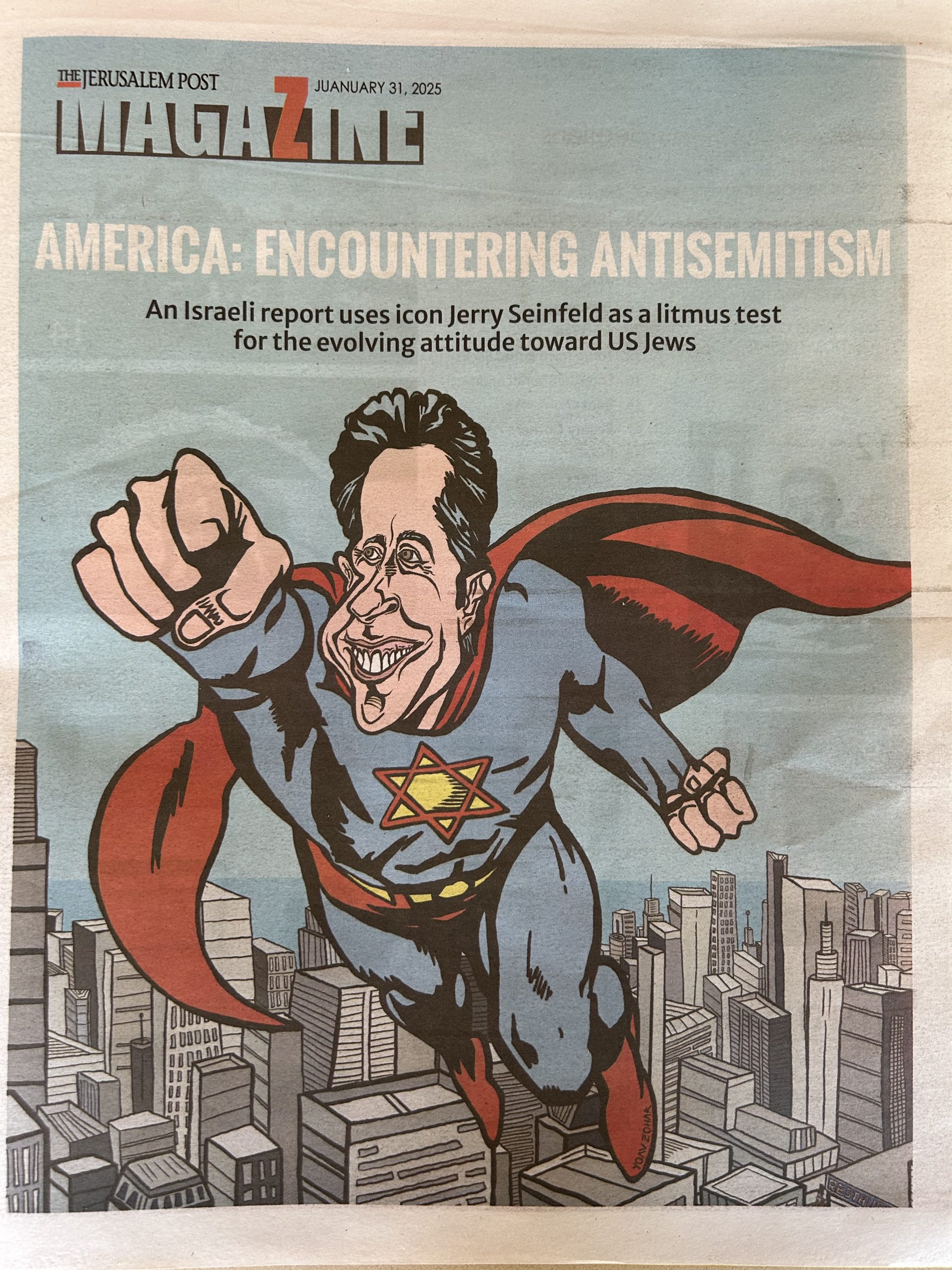
On Monday, January 27, 2025, the Center released its fourth annual For a Righteous Cause Report. The report documents and analyzes some of the past year’s most important developments and initiatives to preserve Jewish heritage, teach about the Holocaust, and combat antisemitism and other forms of racism. It has been widely covered in the press in Israel and abroad, including being the featured article in the Jerusalem Post’s Weekend Magazine and the Report’s cover serving as the cover of the Magazine as well. Below are links to some of the coverage the report has received.
The Jerusalem Post Weekend Magazine – Antisemitism in America: Jerry Seinfeld Then and Now
The Jerusalem Post – ‘For A Righteous Cause’: Holocaust Memorials Persist in Muslim Countries amid Antisemitism
Tel Aviv 360 (Hebrew) – Podcast: Jerry Seinfeld’s and “Seinfeld’s” Conception of Jewishness
Makor Rishon (Hebrew) – An Encouraging Phenomenon: The Rise of Holocaust Memorial Museums in Muslim Countries
Times of Israel – Holocaust Survivors: 80 Years after Auschwitz Liberation, It’s ‘the same Antisemitism’
I24News (Hebrew) – International Holocaust Remembrance Day 2025: Approximately 123,000 Survivors Live in Israel
MSN – ‘For A Righteous Cause’: Holocaust Memorials Persist in Muslim Countries amid Antisemitism
Jewish Press – New Museums Commemorating the Holocaust in Muslim Countries
JNS – Tel Aviv University publishes ‘For a Righteous Cause’ report, timed to Holocaust Remembrance Day
La Página Judia (Spanish) – Nuevos museos conmemorativos del Holocausto en países musulmanes
Cleveland Jewish News – Holocaust Museums in Muslim World Cited as ‘Small Light in the Tunnel’
LPH Info (French) – De plus en plus de musées dédiés à la mémoire de la Shoah émergent dans le monde musulman
Sapo (Portuguese) – Saudações nazi, defesas de Milei e os 80 anos do Holocausto
Shalom Israel (Spanish) – Supervivientes del Holocausto: 80 Años Después de Auschwitz, el Antisemitismo Persiste
Columbus Jewish News – Holocaust Museums in Muslim World Cited as ‘Small Light in the Tunnel’
Akron Jewish News – Shoah Museums in Muslim World Cited as ‘Small Light in the Tunnel’
The JC.A International Jewish News – Shoah Museums In Muslim World Cited As ‘Small Light In The Tunnel’
Aurora – Report Highlights Opening of Holocaust Museums in Muslim Countries
The Mideast Update – Holocaust Museums in Muslim Countries: A ‘Small’ But ‘Very Important’ Light
Bridges for Peace – Holocaust Museums in Muslim Countries: A ‘Small’ But ‘Very Important’ Light
San Diego Jewish World – Holocaust Museums Open in Muslim-Majority Countries
Israelnieuws (Dutch) – Internationale Holocaustherdenkingsdag – Universiteit van Tel Aviv publiceert rapport “Voor een rechtvaardige zaak”

Hundreds of media organizations in Israel and across the world have reported in depth on their frontpages, homepages, and editorials on the Antisemitism Worldwide Report for 2023, published by TAU’s Center for the Study of Contemporary European Jewry and The Irwin Cotler Institute for Democracy, Human Rights and Justice.
Below are some highlights as provided by TAU’s media office.
Reuters – Interview
The Jerusalem Report – From the Editor: Antisemitism, Israel and TAU
Haaretz English (Print) – Report: Antisemitic Incidents Spiked in the West in 2023
DW – Antisemitism rising dramatically across the world — report
Indian Express – Anti-semitism rising dramatically across the world, report finds
South China Morning Post – ‘It’s not 1938’: annual antisemitism report finds worst outbreak since World War II
Times of Israel – Antisemitism surging, report finds, prompting fear for future of ‘Jewish life’ in West
JPost – Tel Aviv University and Anti-Defamation League publish report on antisemitism worldwide for 2023
Jerusalem Post – Worrying Trends for the Future of Jewish Life in the West
Fox News – Antisemitism has proliferated worldwide, new report released on Holocaust Remembrance Day says
Haaretz – Tel Aviv University Report
Haaretz – Print
YNET – The World Against Us
Yediot Aharonot – Print
Hamevaser – Print
Shacharit – Print
Vesty (Russian) – In Russia, Jews are being made scapegoats: a report on anti-Semitism in the world has been published
RTP (Portuguese) – Incidentes antissemitas aumentaram em 2023 após ataque do Hamas
Berliner Tageszeitung (German) – Bericht: Zahl Antisemitischer Vorfälle 2023 Weltweit Stark Angestiegen
Israel HaYom – Even before October 7
Maariv – Even before the war
Globes – Print
Walla! – From the Left and the Right, and not necessarily because of the war
Channel 12 (N12) – A Tsunami of Hate
Le Figaro (French) – Le nombre d’actes antisémites a atteint un «niveau sans précédent» en 2023, selon un rapport mondial
Channel 13 – In the wake of the war, a rise in antisemitism in the West
Kan – Skyhigh Antisemitism
Galatz – Radio Program
Radio 103 – Radio Program
Kan Bet – Radio Program
i24News – New survey finds startling increase in rates of antisemitic incidents around the world
Kan – TV News Report
Channel 13 – TV News Report
The Times – Anti-Jewish incidents soared after October 7 attack, says study
The Hill – Antisemitism surging worldwide since Oct. 7 attack: Report
JNS – World antisemitism report: ‘Oct. 7 helped spread a fire’
Hamodia – Report shows surge in global antisemitism in 2023
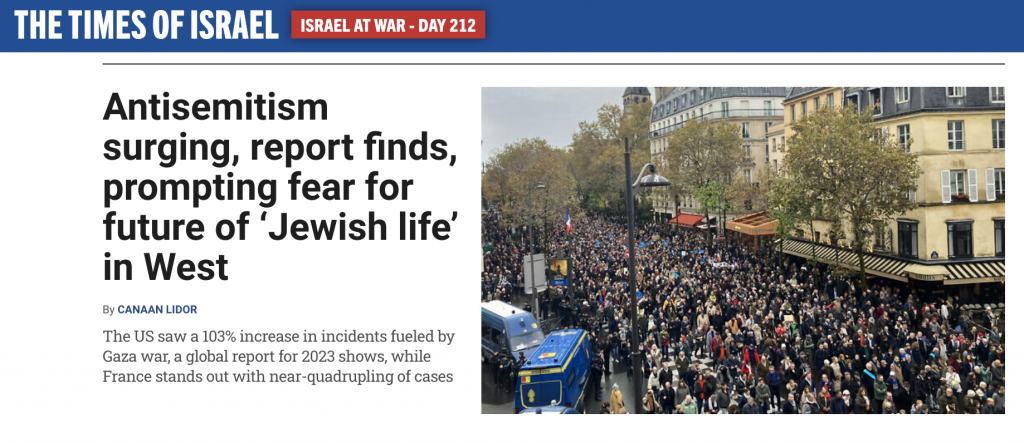
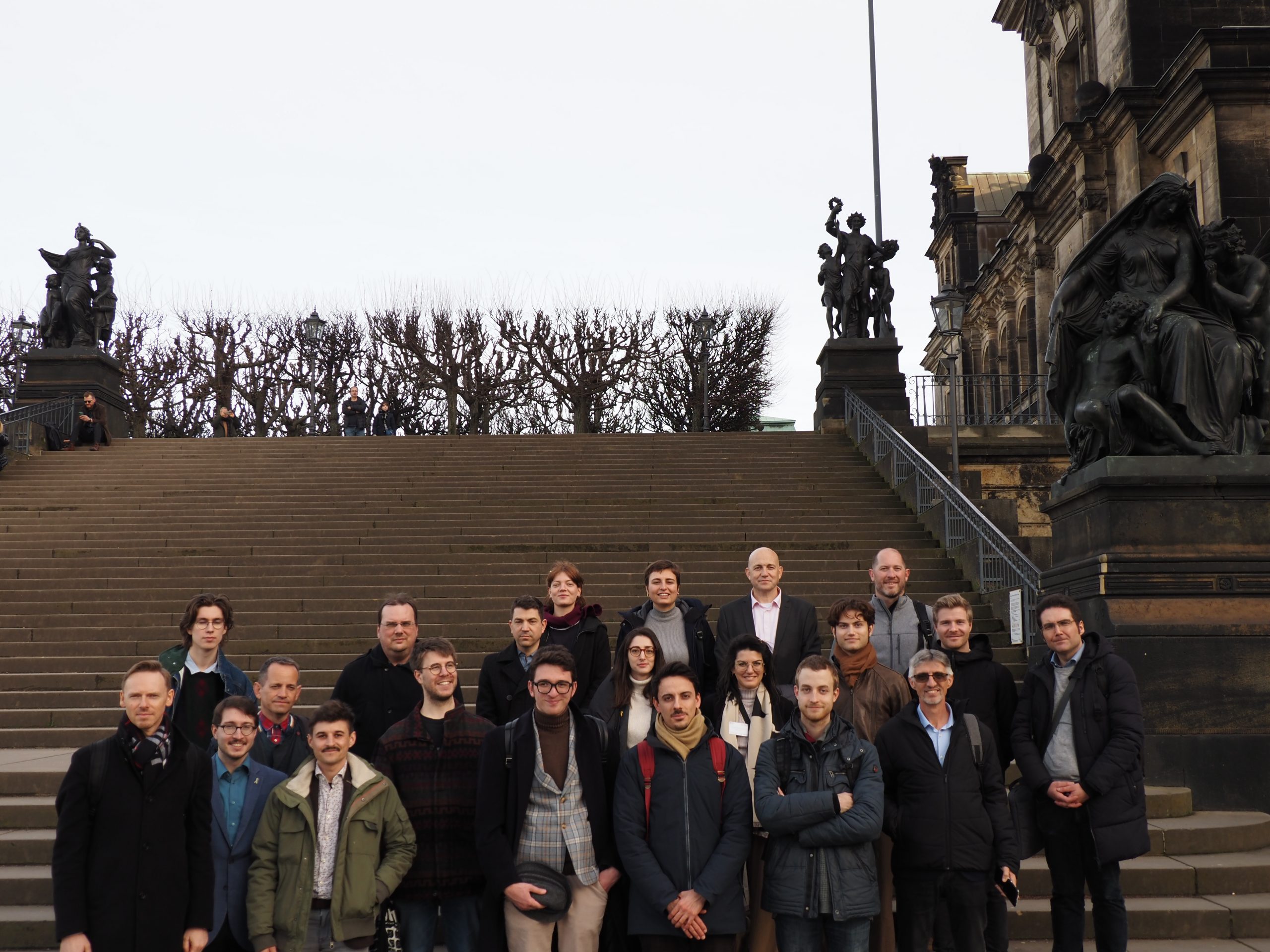
From February 21-23, 2024, a group of young researchers from Israel and Germany came together in Dresden to discuss, compare, and advance research on hate. The conference aimed to better understand the phenomenon of hate, its forms and context of origin, and to situate it politically, socially and culturally. It further strove to provide a space to form relationships and inspire further study on the topic of hate.
The three-day conference was a joint initiative of the German Israeli Foundation (GIF), our Center at Tel Aviv University, and the Technical University of Dresden (TUD). It received additional support from the Science Ministry of the State of Saxony and the Mercator Forum Migration and Democracy (MIDEM). The primary organization for the conference were made by PD Dr. Jörg Sonntag of TUD and Dr. Maik Herold of TUD and MIDEM, who invested several months in planning to ensure the workshop’s success.
The opening ceremony began with speeches from Prof. Dr. Ursula Staudinger, the Rector of TU-Dresden, Sebastian Gemkow, the Minister of Science of the State of Saxony, Dr. Eric Zimmerman, the Director of the German-Israeli Foundation, Mr. Thomas Feist, the Representative for Jewish Life in Saxony, Prof. Dr. Hans Vorländer, the Director of MIDEM, and PD Dr. Sonntag of TU-Dresden.
Their opening remarks were followed by a lecture by Prof. Uriya Shavit, Head of the Center, titled “Where is all this hate coming from?” In his lecture, Prof. Shavit identified three major reasons for the increased visibility of hate: cognitive dissonance, a gap between life and its perception; the unfiltered world of social media with algorithms that promote echo chambers, and the focus of politics on polls and surveys, which, in consequence, promotes centrism and excludes alternative voices from mainstream politics.
Participating researchers came from different academic disciplines like philosophy, political science, sociology, and literature, leading to a wide array of approaches to the central topic. The focus of the lectures ranged from Francesco Petrarca and Plutarch to an analysis of the delegitimization of political enemies, huaman shields in Islam, and the rise of Kahanism in Israel.
The workshop was divided into four sessions, each of which examined different themes related to the main topic. The first session explored historical and philosophical perspectives on hate that provided a framework for the sessions that followed. The second session focused on antisemitism, the oldest hatred, exploring its historical and contemporary manifestations. The third session broadened the discussion on hate beyond antisemitism to explore global perspectives on the politics of extremism in different contexts. The final session of the workshop featured lectures focused on contemporary manifestations of hate in the Middle East.
Beyond the stimulating lectures and discussions in the seminar room, the schedule also included several excursions. A tour of Dresden’s beautiful old town included stops at the Frauenkirche, the hub of Lutheranism, destroyed in the firebombing of the city at the end of the Second World War and rebuilt in the early 2000s, and the Green Vault, a museum housing Europe’s largest collection of treasures in Dresden Castle. The tour concluded with an opening dinner at a cellar of an Italian restaurant in Dresden. The following day, participants took a guided tour of the concentration camp Buchenwald where they learned about its history and the history of concentration camps in Nazi Germany during the Second World War. The final excursion included a visit to Königsstein Fortress in the national park of Swiss Saxony where participants had a guided tour and learned about the important role the fortress played in the history of the region.
– Written by Fridolin Sablatnig
Hate Workshop February 2024 by Carl Yonker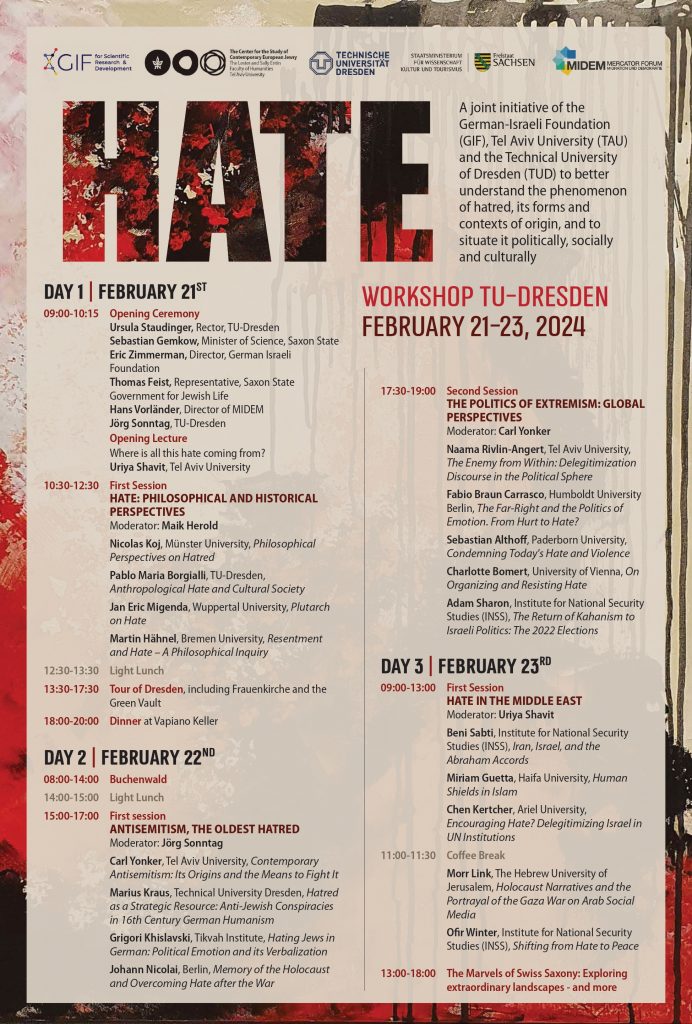
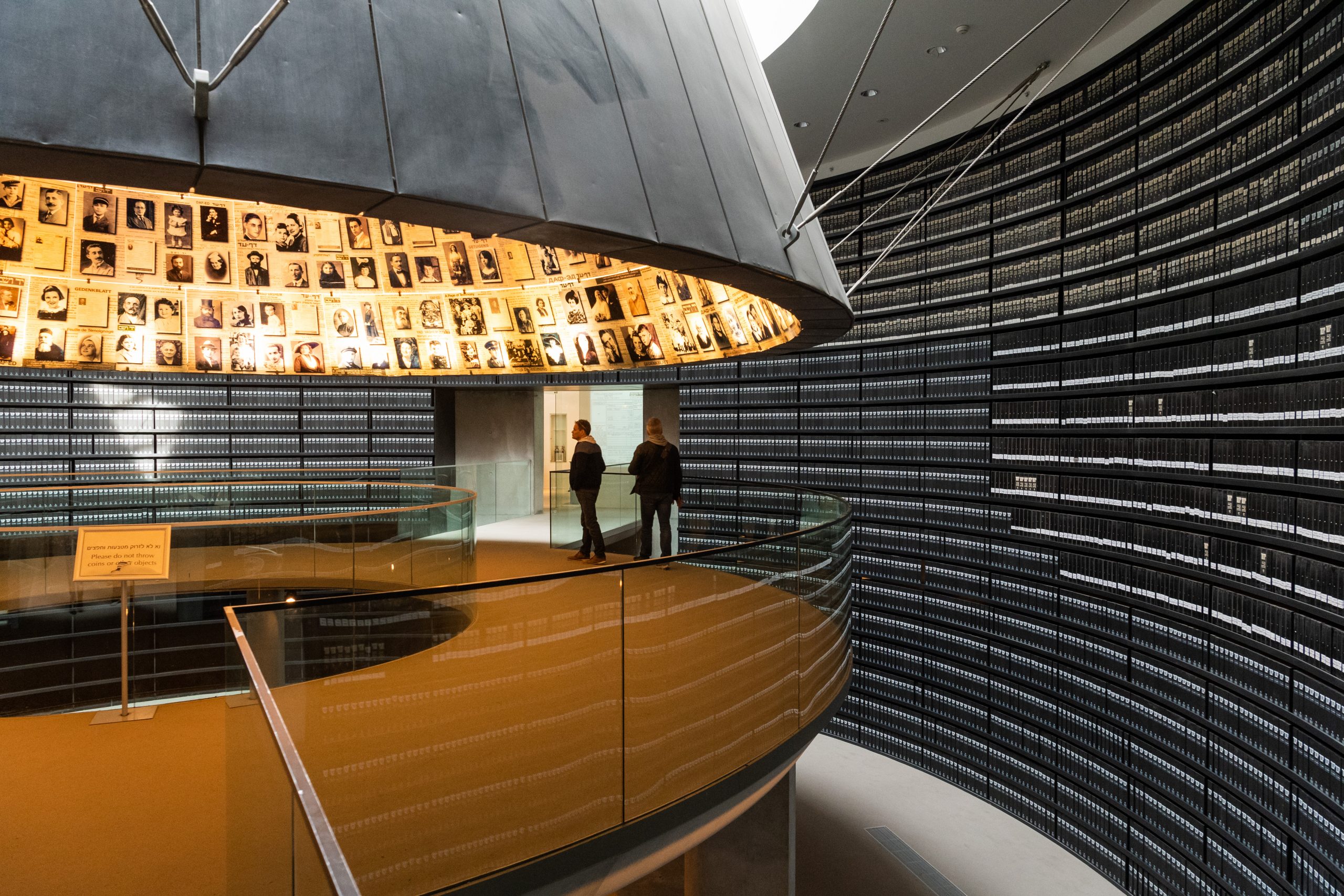
On Sunday, December 8, 2024, Prof. Uriya Shavit, Head of the Center, spoke to the education department of Yad Vashem, The World Holocaust Remembrance Center, on antisemitism in the Muslim World and the challenges of teaching the history of the Shoah in Muslim societies and communities.
Call for Papers – Hate
Workshop, TU Dresden, 21-23 February 2024
General Framework
Hate has become a strong currency in contemporary liberal democracies. Its growing presence is reflected in the rise of radical groups that thrive on intolerance, racial prejudice and resistance of liberal values, in the prosperity of conspiracy theories, and in the popularity of political rhetoric of anger, despair and conflict.
Where is all this hate coming from, and why now? Which expressions does it utilize, which societal contexts and historical roots does it draw on? What can be done to limit its destructive effects? The purpose of the three-day seminar is to promote a better understanding of the phenomenon of hate through interdisciplinary, comparative discussion by young and promising German and Israeli scientists.
This workshop has resulted from a joint initiative of the German-Israeli Foundation (GIF), Tel Aviv University (TAU) and the Technical University of Dresden (TUD). The aim is to better understand the phenomenon of hatred, its forms and contexts of origin, and to situate it politically, socially and culturally. To this end, we invite young German and Israeli researchers to Dresden in February 2024.
Rational and Scope
The workshop has two points of departure. First, hate is an integral part of the human experience and social reality, yet under certain conditions and contexts, its manifestations expand and its disruptive and destructive impacts grow.
Second, understanding hate-phenomena calls for an interdisciplinary approach that examines in historical, comparative and integrated perspectives a plethora of psychological, sociological, cultural, political, technological and judicial developments.
For example, the understanding of the role social media platforms play in disseminating hate speech in our time should be informed by analyses of the role other technological transformations played in the past in facilitating similar phenomena, the psychological functions new technologies serve in comparison to traditional ones, the social and political conditions in which the affects of those technologies take place, and the suitability of existing legal frameworks to address new challenges they create.
We hope that a better, integrated and comparative understanding of hate phenomena will have practical implications and encourage fresh thinking about the means to moderate and eradicate existing expressions and actions.
The aim of the workshop is to constitute a group of young scholars from different disciplines and backgrounds who can inspire each other about the study of hate. The publication of the workshop presentations in a special issue of an international journal is planned.
Call
The organisers welcome applications from young scholars from various disciplines, including history, philosophy, political science, psychology, education, gender studies, criminology, media studies, law and migration studies. We particularly appreciate research papers with comparative or interdisciplinary approaches. Papers will be scheduled for 20 minutes, followed by 30 minutes of discussion.
While we will welcome also presentations of case-studies, priority will be given to scholars who intend to present research that involves comparative or interdisciplinary approaches.
The language of the workshop will be English. Travel and accommodation costs will be covered. In addition, an accompanying programme is planned, including a guided tour of the historical monuments of Dresden and a visit to the Buchenwald concentration camp.
We kindly ask you to send us an abstract (up to 600 words) and a short academic CV with contact details (e-mail, telephone, postal address). Please send your applications to: hass-workshop@tu-dresden.de by 30 November 2023.
Coordination
Prof. Dr. Uriya Shavit (Head of the Center for Contemporary European Jewry Studies, the Cotler Institute for Democracy, Human Rights and Justice and the SDU-TAU Institute for Israel and Jewish Studies)
PD Dr. Jörg Sonntag (Interim-Chair for Medieval History, Institute of History, TU Dresden)
Dr. Carl Yonker (Project Manager of the Center for the Study of Contemporary European Jewry, TAU)
Dr. Maik Herold (Senior Researcher at Mercator Forum Migration and Democracy, Institute of Political Sciences, TU Dresden)
The Center for the Study of Contemporary European Jewry and the Irwin Cotler Institute for Human Rights, Democracy and Justice invite you to watch our seminars on Israel at war:
Strategic Perspectives and Practical Tools in Fight for International Public Opinion
Prof. Uriya Shavit, Tel Aviv University: Hamas – What they Want and Why They Endanger Civilization
Gen. (Ret). Danny Yatom, Former Head of the Mossad: Israel at War – A Strategic Perspective
Dr. Carl Yonker, Tel Aviv University: Using Social Media to Help Fight Evil
Fighting 21st-Century Nazism
Prof. Uriya Shavit, Tel Aviv University: The War – Social and Political Implications
Gen. (retired) Danny Yatom, Former Head of the Mossad: The War So Far – A Strategic Perspective
Dr. Carl Yonker, Tel Aviv University: The Ideology and Strategic Ambitions of Hizballah
Noah Abrahams, Former BBC Journalist: Why I Resigned from the BBC
Dr. Hay Eytan Yanarocak, MDC-Tel Aviv University & JISS: Turkey, Hamas, and the War against Israel
Shiven Nath, Former Irwin Cotler Institute Fellow, Tel Aviv University: India – Official and Public Opinion on the War
Dr. Carl Yonker, Tel Aviv University: The American Radical Right and the War
Q & A
Opening Words
Prof. Youval Rotman, Tel Aviv University
The Challenges for Jewish Communities: Introductory Remarks
Prof. Uriya Shavit, Tel Aviv University
Speakers
Dr. Mia Spiro, University of Glasgow
Prof. Arieh Dubnov, George Washington University
Dr. Aleksandra Gliszczyńska-Grabias, Polish Academy of Sciences
Mr. Ronen Bahar, Head, Jewish Community of Oslo
On Thursday, January 26, 2023, the Center published its annual For a Righteous Cause Report . The report documents and analyzes some of the year’s most important developments and initiatives to preserve Jewish heritage, teach about the Holocaust, and combat antisemitism and other forms of racism. The publication has been widely covered in the press in Israel and abroad. Below are links to some of coverage the report has received.
English
Hebrew
German
Spanish
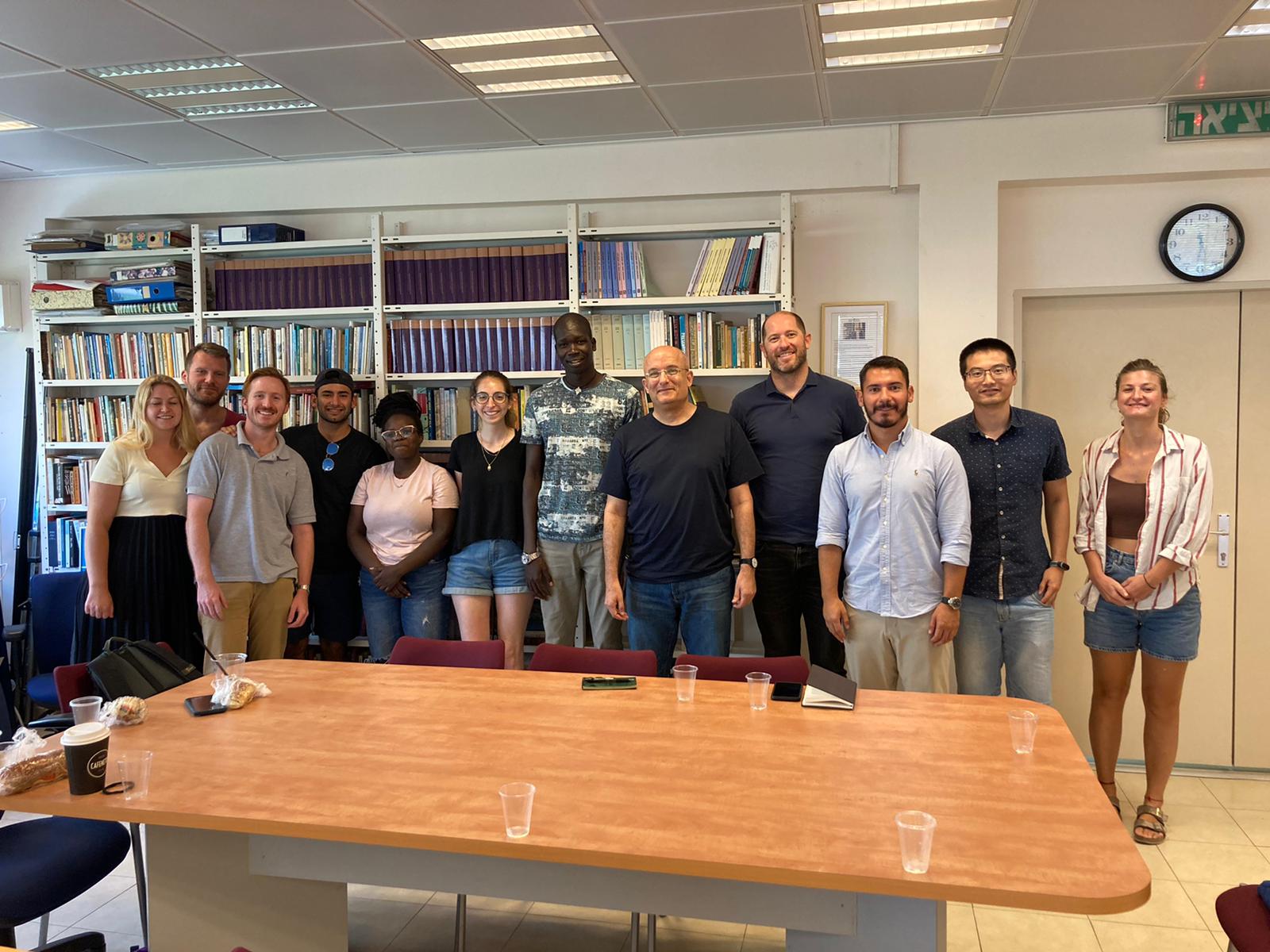
The Center concluded its activities for this academic year and its International Identity Seminar with a real treat – an inspiring, humorous and instructive lecture delivered by Gil Hovav, great grandson of the reviver of the Hebrew Language, Eliezer Ben Yehuda. Hovav, an author and television personality, shared the personal family stories that are behind one of the greatest cultural achievements of the modern era.
The Identity Seminar, which began in May, engaged students with the “big questions” Israeli society faces through field trips and discussions. Among other destinations, the students visited the Sea of Galilee and Gan Hashlosha, Kibbutz Lohamei Ha-Getaot and the Beit Shean National Park.
The program was attended by 25 international students from diverse disciplines and countries, including India, Peru, South Sudan, Italy, Poland, Britain, Ethiopia, Mexico, South Korea, the United States, Argentina, Kenya, Slovakia, Canada, China, Germany and Guatemala. Mauricio Robles Cortes, a Security and Diplomacy Master’s student from Mexico, said that the trips and discussions were a “great experience” that enabled him and others to gain a “broader perspective of Israel which cannot be understood without knowing the historical places we visited.”
Another student, Uwar Mathew Donato from South Sudan, noted that the seminar trips provided him the opportunity to learn more about Jewish history and about the different voices that define Jewish identity in modern times.
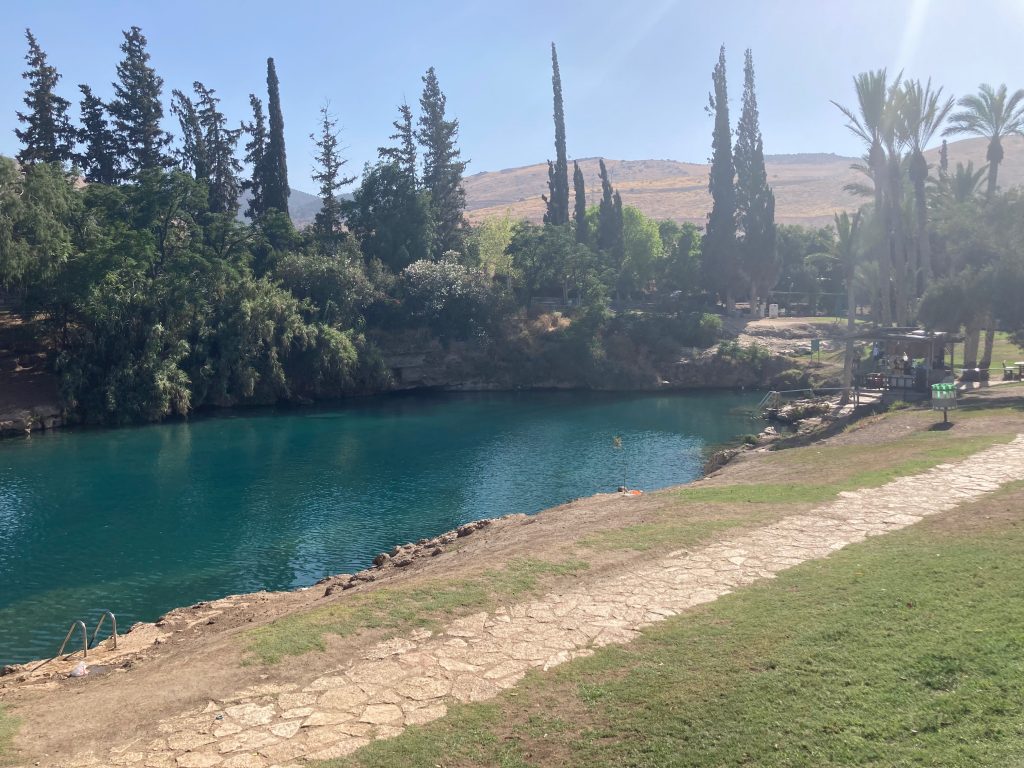
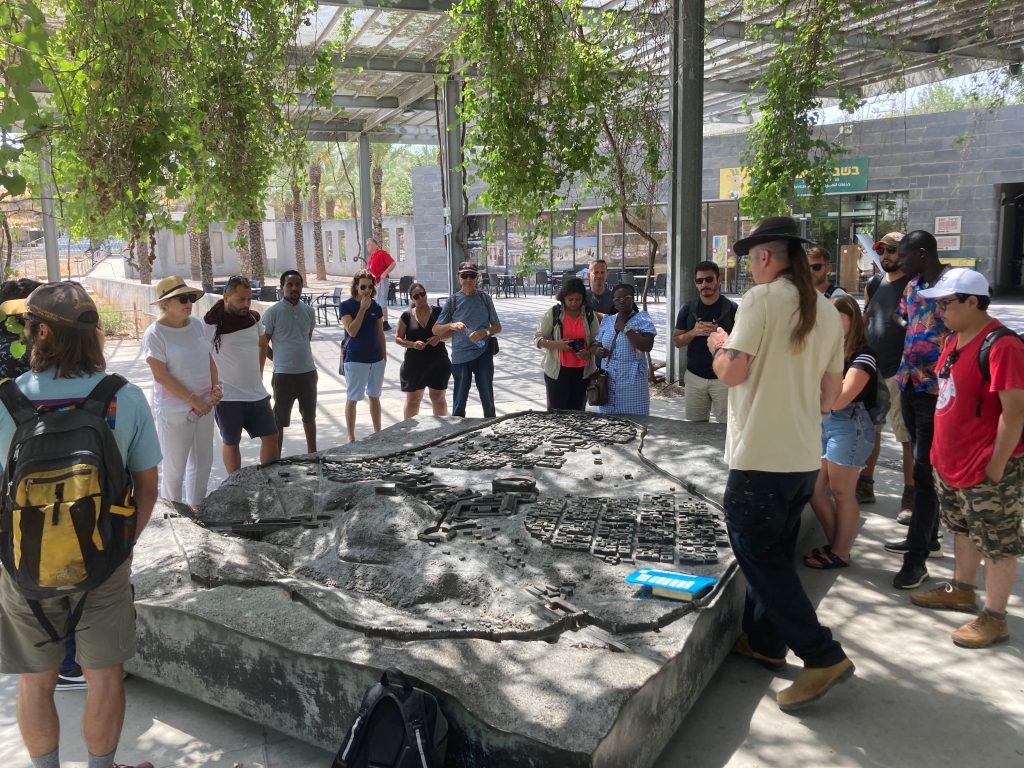
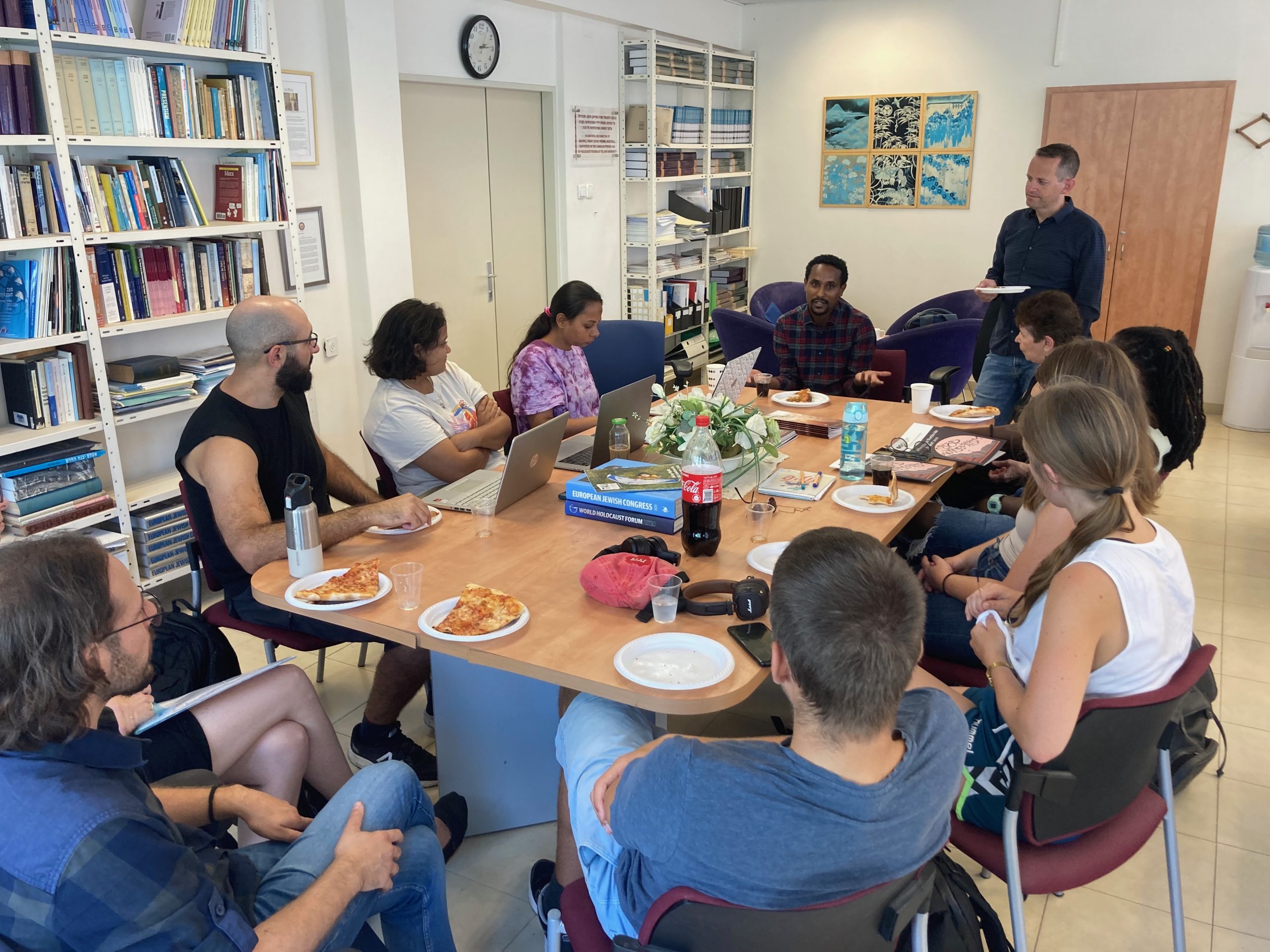
On August 3, the Center concluded its pioneering So the World May Know Seminar with a group of Tel Aviv University international students from across the globe, including Ecuador, India, Ethiopia, Mexico, Germany, Kenya, and Argentina. The two-month Seminar, serving as a pilot for a broader program currently under development, explored central topics related to the Holocaust and antisemitism, and provided participants with practical tools to organize and give workshops in their home countries on the means to fight antisemitism and racism at large.
Reflecting on his experience, Mateo Maya, a Security and Diplomacy Master’s student from Ecuador, said that the lectures he attended provided “a unique experience to understand in a more detailed way some aspects of Jewish history, the Holocaust, and testimonies of Holocaust survivors.” Similarly, Anusha Datta, a documentary filmmaker from India pursuing her master’s degree in film at TAU, said the seminar was “an enriching experience that was successful in condensing an expansive scope of history in a format that made it accessible to international students.”
As several other participants, Mateo and Anusha have already begun working on the workshops they intend to give this fall to university students, educators and officials in their home countries.
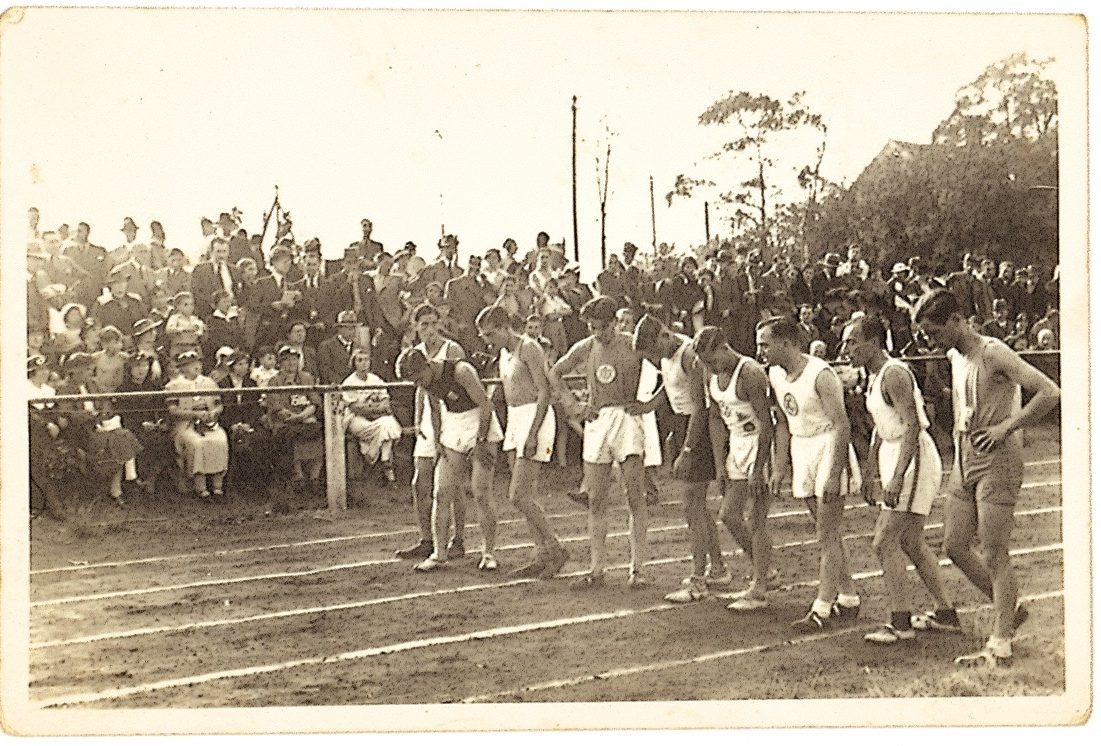
Over the course of the academic year, Dr. Yoval Rubovitch, the recipient of our 2022 research grant, has worked on a project on Jewish sports clubs before and after the Holocaust.
Dr. Rubovitch’s work highlights, among other things, similarities and differences between the current German-Jewish sports association “Makkabi Deutschland” and its predecessor “Deutscher Makkabikreis,” which existed before the Holocaust.
Before the Second World War, Makkabi took upon itself the role of granting Jewish youth a refuge from antisemitism through sports, giving them a sense of Jewish nationhood, a Zionist education, preparing them for emigration to Palestine/land of Israel, and ultimately, the saving of thousands of Jewish lives by helping to organize this emigration through cooperation with other Jewish movements.
Today, Makkabi Deutschland is open to all, Jews and non-Jews alike. The more universalistic approach reflects the vastly different circumstances of German Jews today compared to the 1920s and 1930s, and differentiates it from its predecessor.
However, as in the past, antisemitism remains a threat in Germany, which affects the association’s aims and objectives. Fighting antisemitism is a core part of the association and distinguishes it from other clubs and associations. It seeks to fight antisemitism in Germany – first, by identifying the reasons it exists in German society, particularly among football and sports clubs, and second, by combatting it through education and sports activities.
In addition, Zionism and Zionist ideology still play a major role in Makkabi Deutschland’s identity. The association actively cultivates connections to the state of Israel but, in contrast to the old Deutscher Makkabikreis, does not actively try to convince and prepare young Jews to make Aliyah.
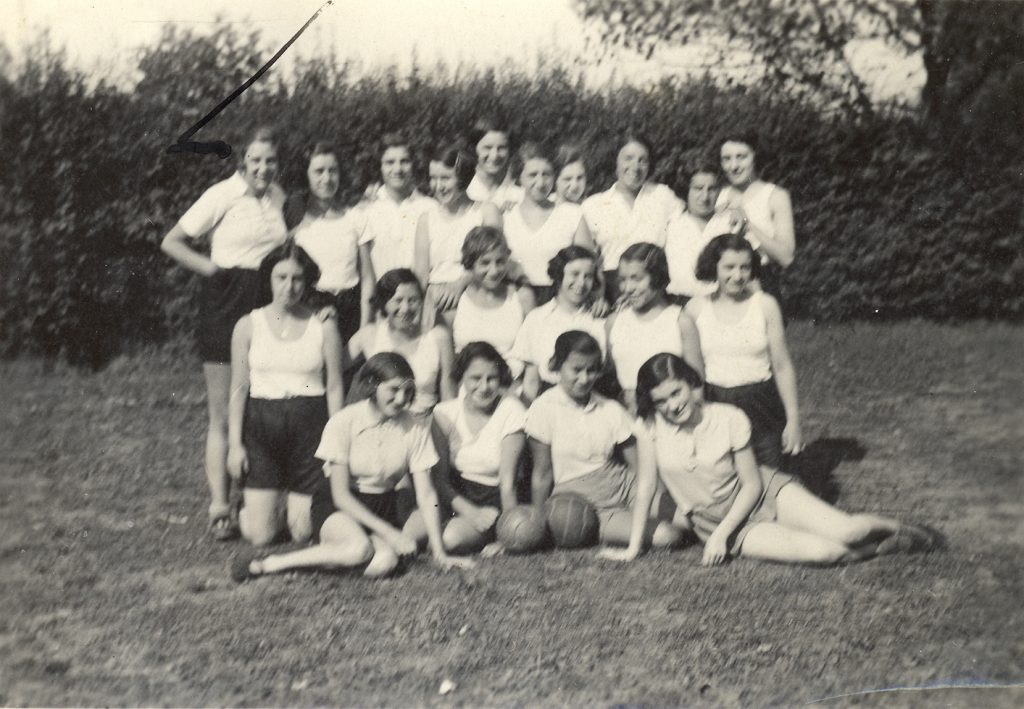

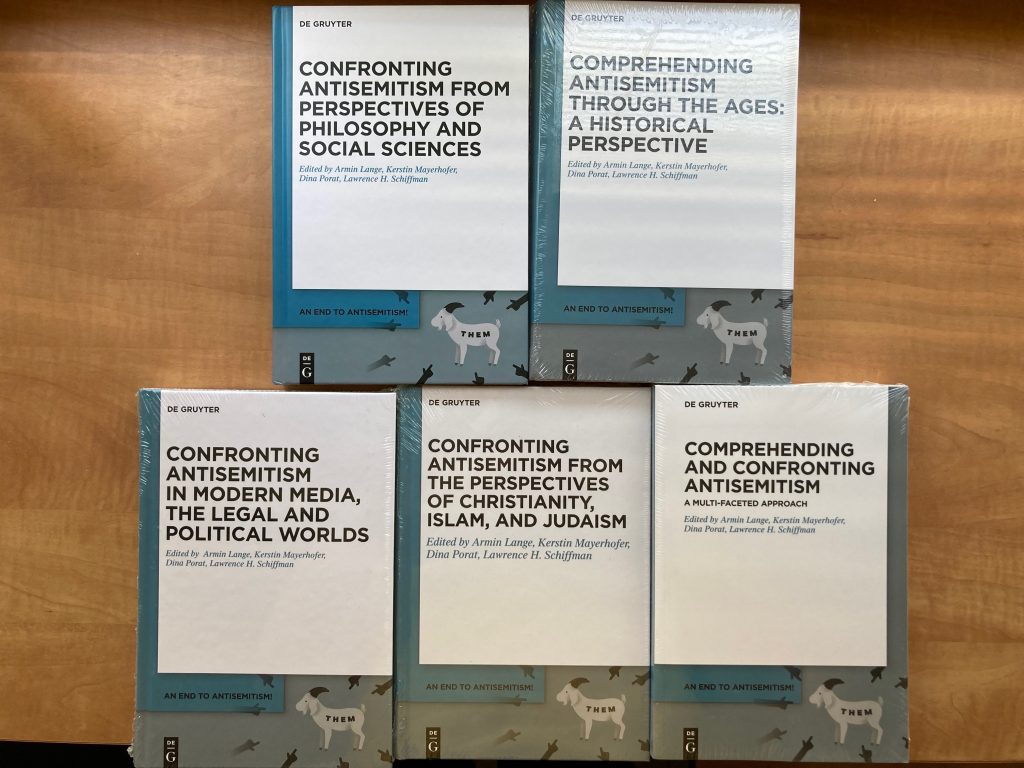
An End to Antisemitism! is a five-volume series published by De Gruyter that brings together more than one-hundred internationally renowned experts to address different aspects of the problem of antisemitism. The studies published in the collection resulted from an international conference held in Vienna, Austria, in 2018 that was organized by the University of Vienna, New York University, Tel Aviv University, and the European Jewish Congress. Prof. Dina Porat, the Center’s Founding Head, served as co-editor of the volumes together with Armin Lange, Kerstin Mayerhofer, and Lawrence H. Schiffman.
The first volume, Comprehending and Confronting Antisemitism: A Multi-Faceted Approach, offers a comprehensive overview on the history of and discourse about antisemitism. The second volume, Confronting Antisemitism from the Perspectives of Christianity, Islam, and Judaism, engages with antisemitic stereotypes as religious symbols that express and transmit a belief system of Jew-hatred. Volume three, Comprehending Antisemitism through the Ages: A Historical Perspective, deals with the long history of antisemitism, while volume four, Confronting Antisemitism from Perspectives of Philosophy and Social Sciences, addresses the role of antisemitism in philosophy, pedagogy and social sciences. Lastly, the fifth volume, Confronting Antisemitism in Modern Media, the Legal and Political Worlds, explores manifestations of antisemitism in the media, legal and political worlds.
The volumes are Open Access and available for download as PDF files on the De Gruyter website here. Printed copies can also be purchased from De Gruyter at the same link.
On May 1, the Center for the Study of Contemporary European Jewry at Tel Aviv University launched its pioneering Identity Workshop, in which international students explore Israeli and Jewish histories and realities through field trips across the country.
The program is attended by 25 international students from diverse academic disciplines and countries, including India, Peru, South Sudan, Italy, Poland, Britain, Ethiopia, Mexico, South Korea, the United States, Argentina, Kenya, Slovakia, Canada, Germany, and Guatemala.
The first field trip included a guided visit to the Ghetto Fighters Museum in Northern Israel followed by a discussion of the socio-historical roots of Nazi barbarism; a meeting with the Christian-Aramean community in Gush Halav, in which its quest for recognition was debated; and a visit to the Sea of Galilee. More exciting and informative field trips and discussions will follow.
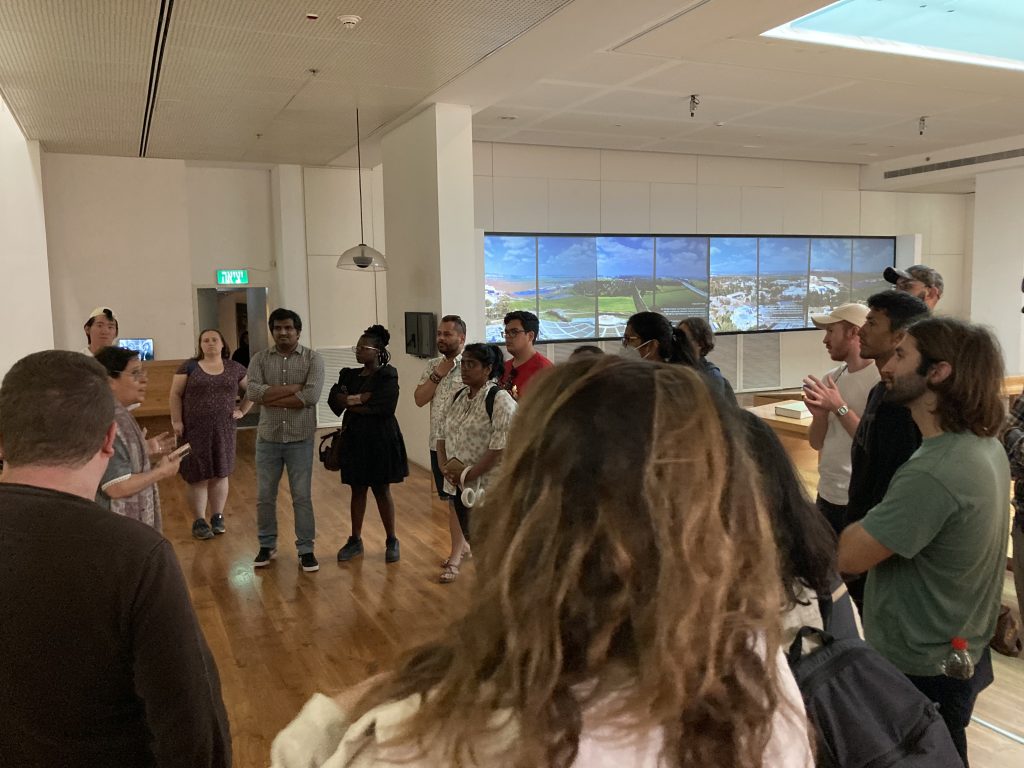
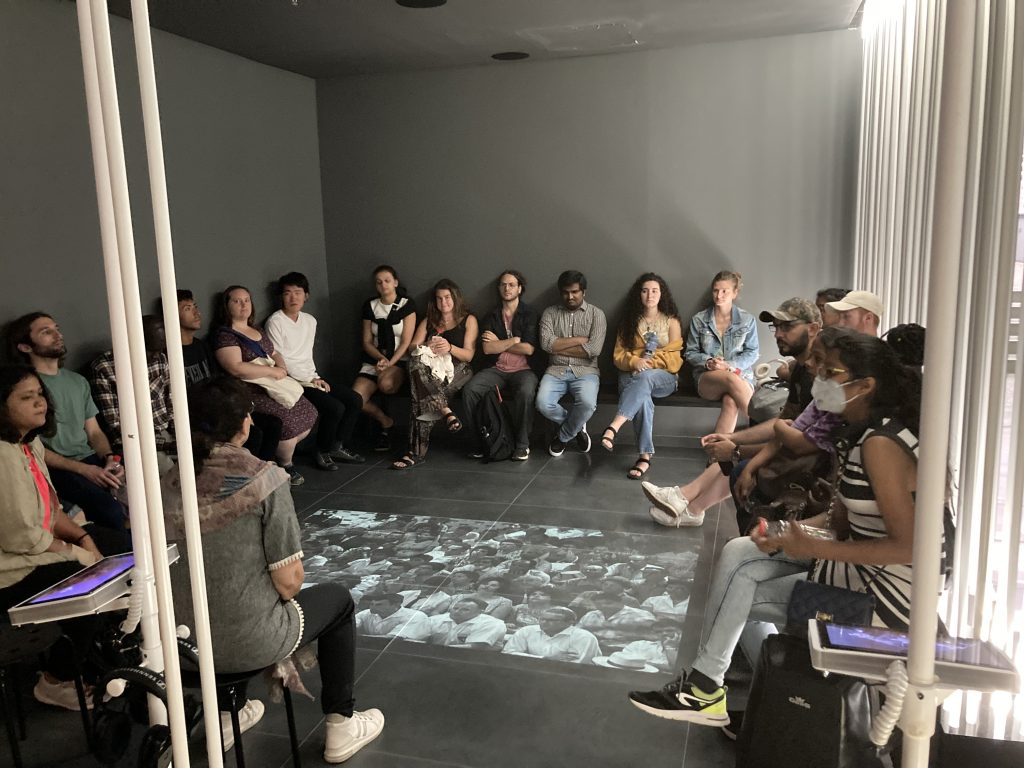
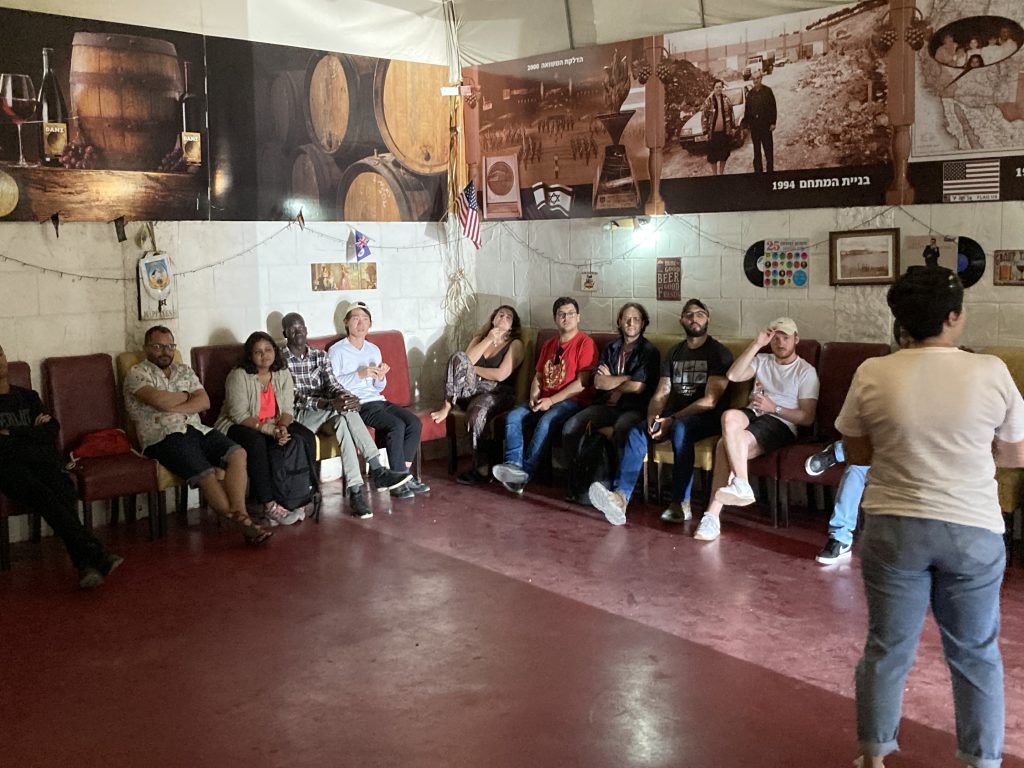
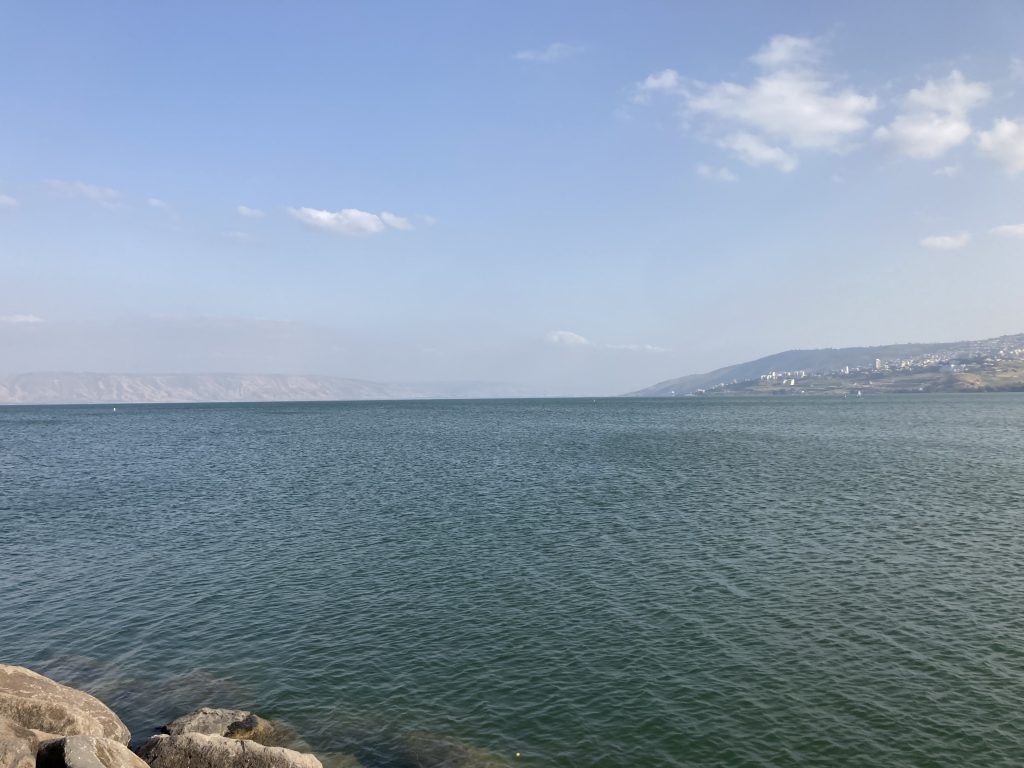
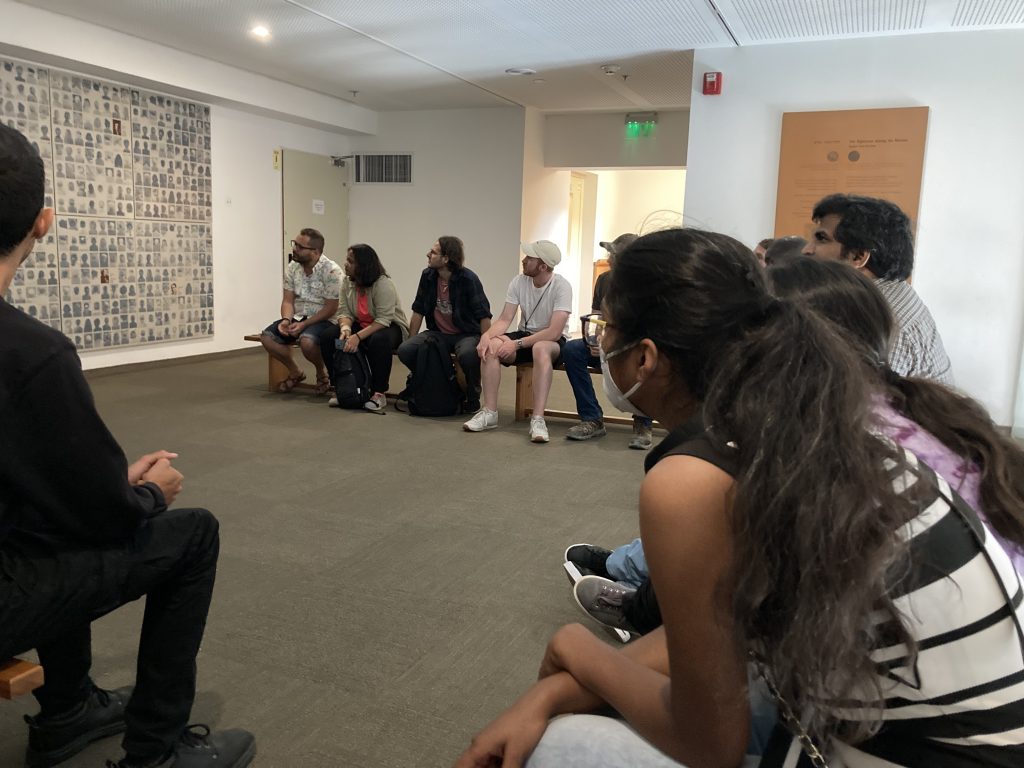

On Wednesday, April 27, 2022, the Center released its annual report on the state of antisemitism worldwide. The publication of the report has been widely covered in the international and Israeli press. Below are links to some of the coverage the report has received in English, Hebrew, and other languages.
English
Hebrew
Other
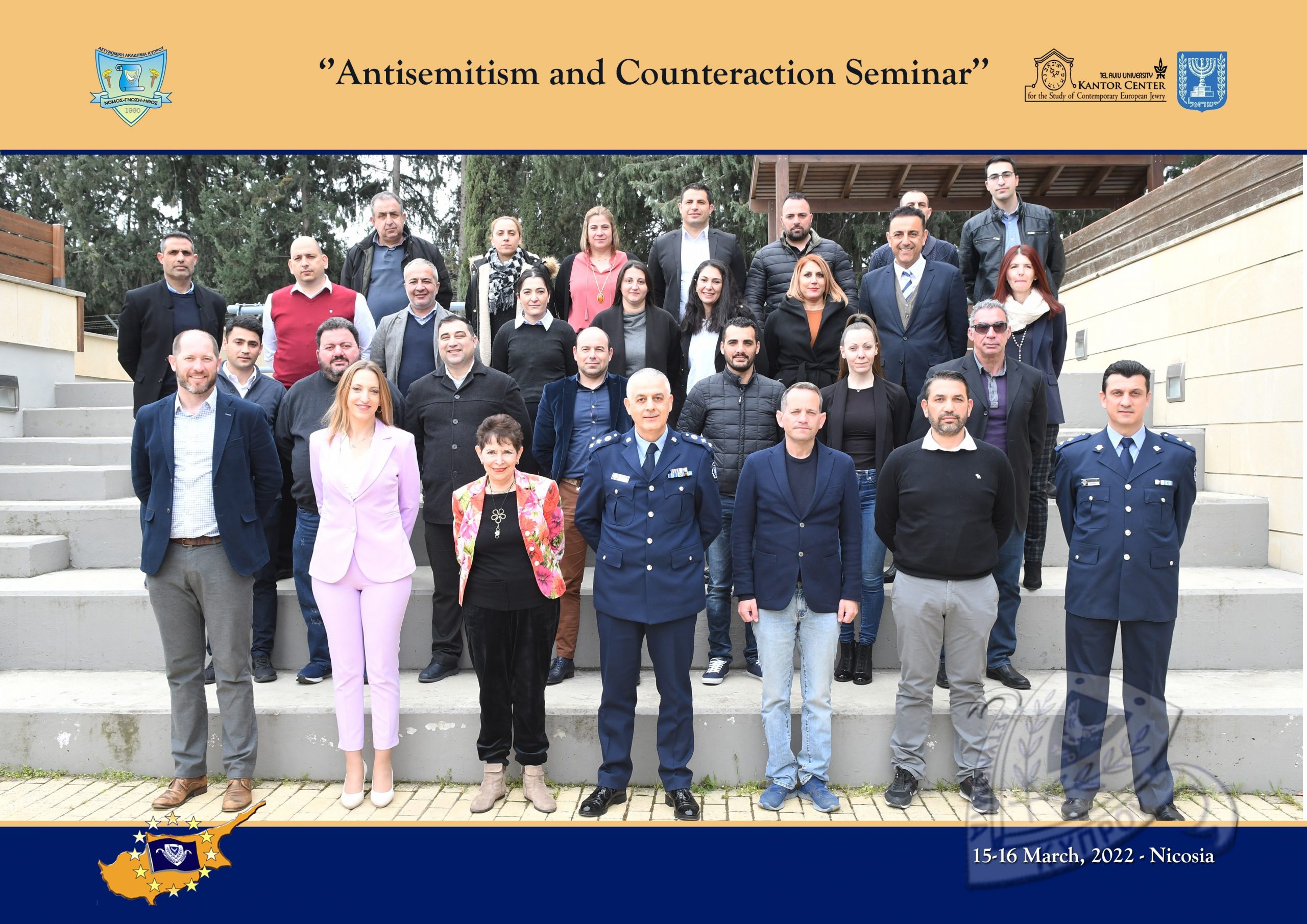
On March 15-16, our Center led a seminar and training for 25 high-ranking Cypriot law enforcers and other top Cypriot public officials in Nicosia. The seminar, which gained wide coverage in the local media, was initiated and organized by the Israeli Foreign Ministry and the Embassy of Israel in Cyprus, together with the Cypriot Ministry for Justice and Public Order.
Prof. Uriya Shavit, Head of the Center, gave lectures on the history of Zionism and the reasons for the current-day proliferation of destructive conspiracy theories. Dr. Dina Porat, Founding Head of the Center, spoke about the history of antisemitism and the legal means of fighting it. Dr. Carl Yonker, Researcher and Media Director at the Center, discussed the Dark Web and antisemitism in the American and European far-right and far-left movements.
In the opening ceremony, Cyprus Minister of Justice, Stephie Dracos, emphasized racism and discrimination must be dealt with immediately and effectively. Stylianos Papatheodorou, Cyprus Police Chief, spoke on the importance of the seminar in raising awareness about the Holocaust among members of the police and relevant ministries and institutions in Cyprus. Israel’s Ambassador to Cyprus, Oren Anolik, noted that learning about the historical roots of antisemitism helps understand its manifestations today.
Prof. Shavit noted the recent public statement of the leading researches of the Center, who condemned the war crimes committed under the directives of Vladimir Putin, as well as Putin’s cynical distortion of the Holocaust.
The participants in this first-of-its-kind seminar expressed their deep appreciation for the opportunity to gain knowledge and tools to help them in their jobs as frontline law enforcers. Maria Efren from the Operations Office Nicosia stated that the seminar provided her with practical knowledge on identifying antisemitism, as well as techniques and tools for investigating online antisemitism. Michalis Angelides, the Safety and Security Officer of the Cyprus Football Association, expressed how important the seminar was to him in providing practical tools to apply in his current role.
At the end of the seminar, participants were awarded a certificate of participation by Themistos Arnaoutis, Chief Superintendent Director of the Cyprus Police Academy, and Noga Caspi, Deputy Head of Mission of the Israel Embassy in Nicosia.
Prof. Shavit thanked the Cyprus Police for their exceptional hospitality and keen interest. He congratulated the Israeli embassy in Cyprus on the superb organization of the seminar, and Ruth Cohen Dar, Director of the Foreign Office Department for Combating Antisemitism and for Holocaust Remembrance, for her dedicated efforts and pioneering initiative.




We condemn Russia’s unprovoked invasion of Ukraine and the cowardly war crimes committed under the directives of Vladimir Putin.
The fascist-styled aggression stands against some of the most important moral lessons humanity should have learned from the Nazi period, including the sanctity of human life and the sovereignty of democratic, peaceful nations. Putin has the blood of thousands of victims, including children, on his hands. His policies pose an existential threat to world democracy, peace, and security.
To add insult to injury, in claiming that present-day Ukraine, with its Jewish president, is Nazi, Putin has trivialized the memory of the Holocaust. He entirely discredited his past commitments to fight antisemitism and placed himself among a notorious group of Holocaust distorters.
As a minority in all countries but Israel, Jews learned that fascist regimes often pose the gravest threats to their existence, and democracy is the best guarantee for their wellbeing.
As students of history, we know there is time for nuance and time for clarity. So let us be clear in standing up unequivocally against Putin’s war crimes, oppression, and threats.
Prof. Uriya Shavit, Head
Prof. Dina Porat, Founding Head
Dr. Giovanni Quer, Project Manager
Dr. Carl Yonker, Researcher, Media Director
The Center for the Study of Contemporary European Jewry at Tel Aviv University welcomes applications for its annual Identity Seminar. The Identity Seminar comprises three one-day study trips that will explore core historical, social, and cultural issues through visits to some of Israel’s most beautiful and interesting sites and meetings and discussions at those sites with leading scholars and public figures.
Among the issues addressed in the seminar: the tension between utopia and normalcy in Zionist thought; Biblical archeology; the role of the Holocaust in shaping contemporary Israeli society; Israel-Diaspora relations; the Christian communities of Israel; and the identity challenges of Arab-Israelis.
Along with lectures and discussions, the three study trips will include visits to Kibbutz Lohamei HaGetaot, the Dead Sea, the Sea of Galilee and Gan Hashlosha, the communities of the Ultra-Orthodox in Jerusalem and the Black Hebrew Israelites in Dimona, and several exciting archeological and religious sites.
The day-trips will take place on Sundays from 09:00 to 20:00. The scheduled dates for the seminar are May 1, May 29, and June 12.
Applications are open to TAU international students with public leadership potential at all levels, of all faiths, and of all nationalities.
Lectures, discussions, and instruction will be in English.
Participants will be awarded a letter of documentation. Participation is free of charge.
Applications (including a short CV and contact details) should be sent to Dr. Giovanni Quer, the Kantor Center’s Project Manager, by March 11, 2022: giovanniquer@tauex.tau.ac.il
The Center will accept up to 14 applicants.
On February 22, the Center hosted a distinguished delegation from the Babyn Yar Holocaust Memorial Center (BYHMC) led by the Hon. Aleksander Kwaśniewski, the former President of Poland (1995-2005) and member of the BYHMC’s Supervisory Board. The visit took place amid rising tensions in Ukraine, just hours before Russia began its military operations.
During the meeting, President Kwaśniewski spoke about the importance of commemorating the untold and forgotten story of the Holocaust in Ukraine and Babyn Yar as a symbol of what is known as the “Holocaust by Bullets.” President Kwaśniewski stressed that the projects at Babyn Yar are key to fighting antisemitism and racism while honoring the memory of the victims.
President Kwaśniewski expressed his hope to promote cooperation between the BYHMC and the Center.
The BYHMC’s Artistic Director Ilya Khrzhanovsky also discussed his important role in designing an immersive experience that takes visitors on an emotional and historically fact-based journey to commemorate and honor the victims of the Holocaust’s largest single-mass-shooting and the largest mass grave in Europe.
The discussion ended with a conversation on current events in Ukraine. President Kwaśniewski noted that the world finds itself in a dreamlike situation and in different times, and noted that Russian President Vladmir Putin was using dangerous rhetoric that declares that Ukraine is neither a state nor a nation. The President stressed the importance of limited terms in democracy, noting that long periods in power project negatively on leaders’ conduct and self-perception.
The Head of the Center, Prof. Uriya Shavit, said: “We are honored to host such a distinguished delegation, led by a European icon of democracy and tolerance, a man for whom the lessons of the past are a constant moral obligation.”

This week, De Gruyter published Prof. Lilach Lev Ari’s new book, Contemporary Jewish Communities in Three European Cities: Challenges of Integration, Acculturation and Ethnic Identity. The Center was proud to support Prof. Lev Ari’s research that resulted in the publication of this new monograph, which expands and builds upon a report she authored for the Center in 2019. Contemporary Jewish identity, integration and acculturation in Europe has become an increasingly relevant topic amid rising incidents of antisemitism in Europe but reliable research on the present state of Jewish identity in Europe is scarce. In Contemporary Jewish Communities, Prof. Lev Ari, the dean of the Faculty of Graduate Studies and a lecturer at Oranim College, examines three ethnically diverse communities – Paris, Brussels, and Antwerp – to shed light on the identity and acculturation of the Jewish minority in Europe.
To purchase a copy of book the book, visit De Gruyter or Amazon.
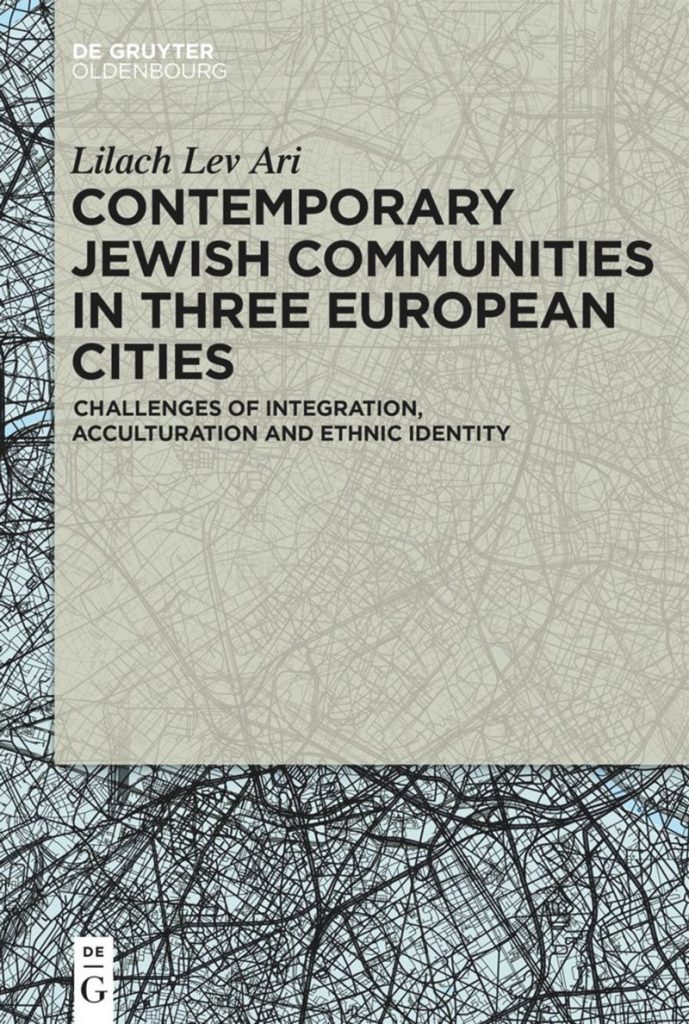
On Thursday, January 27, 2022, the Center presented its inaugural report on encouraging legal, political, and cultural developments in the fight against antisemitism to the President of Israel, Isaac Herzog at a ceremony held at his official residence in Jerusalem. The publication and presentation of the report, titled For A Righteous Cause: Positive Trends in Fighting Antisemitism and Radicalization around the World, has been widely covered in the press in Israel and abroad. Below are links to some of coverage the report has received in English, Hebrew, and Swedish.
English
Hebrew
French
Swedish
On a snowy Thursday in Jerusalem, a delegation from the Center, led by Prof. Uriya Shavit, the Head of the Center, presented its inaugural report on encouraging legal, political, and cultural developments in the fight against antisemitism to the President of Israel, Isaac Herzog. President Herzog was presented the report, titled For A Righteous Cause: Positive Trends in Fighting Antisemitism and Radicalization around the World, at a special ceremony held at his official Jerusalem residence on International Holocaust Remembrance Day (January 27), the day on which the Auschwitz death camp was liberated in 1945.
The report is the product of a six-month team effort by eight academic experts at Tel Aviv University from various fields and addresses positive developments in a number of different areas. The contributors include: Dr. Inna Shtasker, who wrote on the restoration of Jewish cemeteries in Eastern Europe; Dr. Ofir Winter and Dr. Giovanni Quer, who wrote on encouraging developments in the United Arab Emirates and Bahrain; Prof. Dina Porat, who wrote on political and legislative developments in Europe and North America; Dr. Tomer Fadlon, who wrote on the efforts of sports organizations and clubs to combat antisemitism; and Adv. Talia Naamat, who wrote on legal developments in Europe and the United States.
In his opening remarks, Prof. Shavit addressed the impetus behind the report and the purpose in highlighting encouraging legal, political, and cultural developments in the fight against antisemitism. Noting that discourse on antisemitism typically focuses on troubling negative trends, Prof. Shavit stated, “[The Center] decided that a positive report, describing encouraging developments and activities, should also be published – for three reasons: expressing appreciation for those already active; impelling more governments and organizations worldwide to initiate similar activities; and promoting a discussion on concrete proposals for improving existing programs.”
Adv. Arie Zuckerman, the Chairman of the Center’s Board, spoke after Prof. Shavit and noted the rise in antisemitic incidents in the last several years, much of it fueled by conspiracy theories connected to the COVID-19 pandemic. This, in turn, has led to a growing sense of insecurity among Jewish communities across Europe and around the world. Nevertheless, as the Center’s new report shows, positive steps have been taken in the past year to fight against the rise in antisemitism. These efforts should be commended and others should be encouraged to follow their example.
Two of report’s contributors, Prof. Dina Porat, the Center’s Founding Head, and Dr. Tomer Fadlon, spoke briefly about their respective articles, highlighting political and legislative developments and developments in the world of sports in fighting antisemitism and radicalization. In addition, Dr. Carl Yonker, the Center’s Media Director, commented on the recent hostage crisis at the Colleyville synagogue in Texas and the need to encourage local Christian communities to more proactively engage with local Jewish communities to provide better support and create a sense of security.
In his closing remarks, President Herzog expressed his appreciation for the report and observed that while the crisis of global antisemitism is intensifying, so, too, are international efforts to fight against it. Indeed, stated President Herzog, “We are witnessing many initiatives for combating antisemitism around the world, and we must encourage and foster these positive trends. Strengthening the light is just as important as fighting darkness. I thank the Center for its dedicated research and faithful work in monitoring antisemitism worldwide.”
President Herzog also added, “I wish you much luck and I want to thank Tel Aviv University and the Center within it. I am an alumnus of the University, a friend of the University, and I think it’s a very worthy place. [The Center] is one of the most important Centers in Israeli academia and at TAU specifically.”
For a Righteous Cause – Annual Positive Report 2022 (Footnotes)
For a Righteous Cause – Annual Positive Report 2022 (without Footnotes)

The Center is pleased to announce that Dr. Yoval Rubovitch is the recipient of our 2022 research grant. Over the course of the year, Dr. Rubovitch will conduct a research project on the connections, similarities, and continuities between Jewish sports clubs before and after the Holocaust, focusing primarily on the Maccabi clubs in Leipzig and Frankfurt. As part of his research, he will interview members of the Leipzig and Frankfurt clubs and the Maccabi sports association in Germany, and will also examine the current literature on this topic.
Dr. Rubovtich has a prolific research and publications record. He completed his doctoral studies at the Martin Luther University of Halle-Wittenberg in 2019. His dissertation examined the debate on Zionism between Karl Kautsky and Eduard Bernstein, two of Germany’s leading theoreticians on social democracy. His book Marxismus, Revisionismus, Zionismus: Eduard Bernstein, Karl Kautsky und die Frage der jüdischen Nationalität (“Marxism, Revisionism, Zionism: Eduard Bernstein, Karl Kautsky and the Question of Jewish Nationality”) was published in August 2021 by Hentrich & Hentrich, a publishing house in Leipzig. He has also authored a biography of Bernstein (2019) and a book about the “Bar Kochba Leipzig” Jewish sports club (2020), both of which were published by the same publisher.
The Center is pleased to share the following news:
Next year, the city of Ramat Hasharon will celebrate its 100th anniversary, commemorating its establishment in 1922 as Ir Shalom (City of Peace) on lands purchased from several Arab landowners. Originally a small moshav (an agricultural settlement), Ramat Hasharon became a city in 2002 with a population of over 50,000. Every year, the city council nominates four candidates as honorary citizens, from which the mayor selects a single honoree. This year, the Ramat Hasharon selected Prof. Dina Porat, the Founding Head of the Center, as the city’s honorary citizen in acknowledgment of all her contributions to fighting antisemitism and to the community she and her family have lived since 1976.
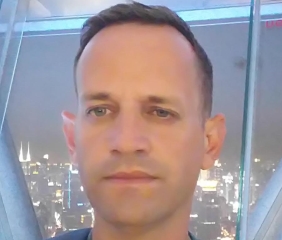 Prof. Uriya Shavit was appointed the new head of the Center for the Study of Contemporary European Jewry. He succeeds Prof. Dina Porat, who founded the Center and made it an internationally acclaimed authority on European Jewry and antisemitism.
Prof. Uriya Shavit was appointed the new head of the Center for the Study of Contemporary European Jewry. He succeeds Prof. Dina Porat, who founded the Center and made it an internationally acclaimed authority on European Jewry and antisemitism.
Prof. Shavit, Full Professor at Tel Aviv University, specializes in Jewish-Muslim relations in Europe, among other fields. He is the author of nine academic books and several dozen academic articles, as well three novels and six books for young readers.
Prof. Porat will continue her work with the Center as its Founding Head, advising its activities and serving as chief author of its annual reports.

The Center announces its call for research proposals for 2022.
Proposals selected will be awarded grants of up to 20,000 Shekels.
Priority will be given to high-risk and policy-oriented proposals and to submissions by scholars who have completed their PhDs but have not begun their post-doctoral studies.
Submissions should comprise a short description of the planned research (up to 1,750 words), including methodology, research questions, hypotheses, timeline and state of the art, and the candidate’s curriculum vitae.
Proposals should focus on one of the following themes:
Projects should involve approximately a one-year study and should conclude with the publication of an article in a peer-reviewed journal in English.
Research proposals should be submitted by November 1, 2021, to the Center’s project manager, Dr. Giovanni Quer: giovanniquer@tauex.tau.ac.il
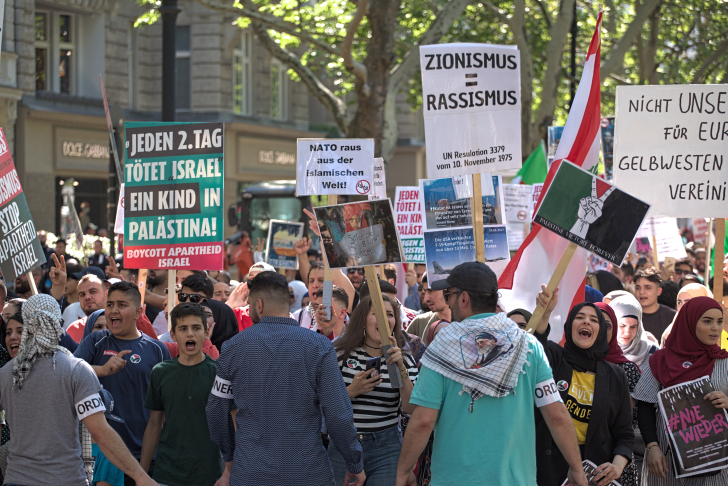
On June 16, 2021, the Center organized the Zoom conference, “Who is an antisemite? The Polemic and its Significance”, in which participants discussed the IHRA’s (International Holocaust Remembrance Alliance) working definition of antisemitism.
Prof. Yehuda Bauer gave the keynote speech, which was followed by a roundtable discussion with Rabbi Andrew Baker (Director of International Jewish Affairs at the American Jewish Committee), Prof. Alvin Rosenfeld (Director of the Institute for the Study of Contemporary antisemitism at Indiana University), Ms. Katharina von Schnurbein (EU Coordinator on Combating antisemitism), and Mr. Mark Weitzman (Director of Government Affairs at the Simon Wiesenthal Center).
During the conference’s final session, Tel Aviv University’s Prof. Dina Porat and Prof. Moshe Zuckermann engaged in a passionate debate about the implications of the IHRA’s working definition of antisemitism. The recording of the conference, held on Zoom, is available here.
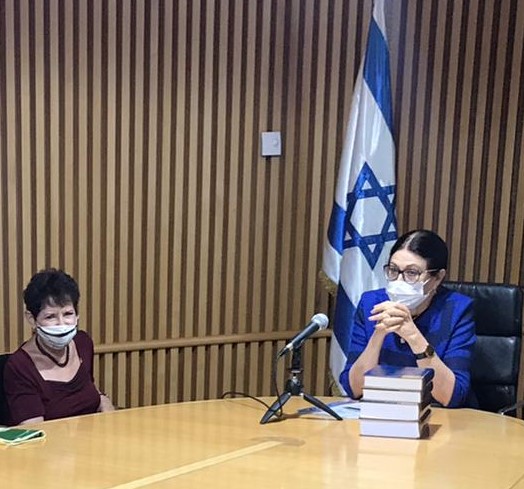
On June 27, 2021, Prof. Dina Porat, Founding Head of the Center, Prof. Yoram Dinstein, former President of Tel Aviv University, and Adv. Talia Naamat met with Justice Esther Hayut, President of the Supreme Court of Israel, to discuss the Center’s legal research. The three presented Justice Hayut with the Center’s four-volume study on human rights and equality, “Legislating for Equality – A Multinational Collection of Non-Discrimination Norms”.
Brill published the four volumes containing studies and analyses edited by Adv. Naamat and Prof. Porat along with Nina Osin, Elena Pesina, and Giovanni Quer. For the first time, the volumes collate the 195 UN Member States’ constitutional provisions and laws pertaining to non-discrimination. They provide a basis for research and comparative analysis on the issues of equality and protection of minority rights, and provide access to legal sources hitherto unavailable in the English language. Prof. Porat thanked the President of the Supreme Court Justice Hayut for hosting the event and said: “We hope that these volumes will contribute, even modestly, to the fight against discrimination in the world.”
Further information about the volumes can be found on the Brill website: https://brill.com/view/package/9789004227569